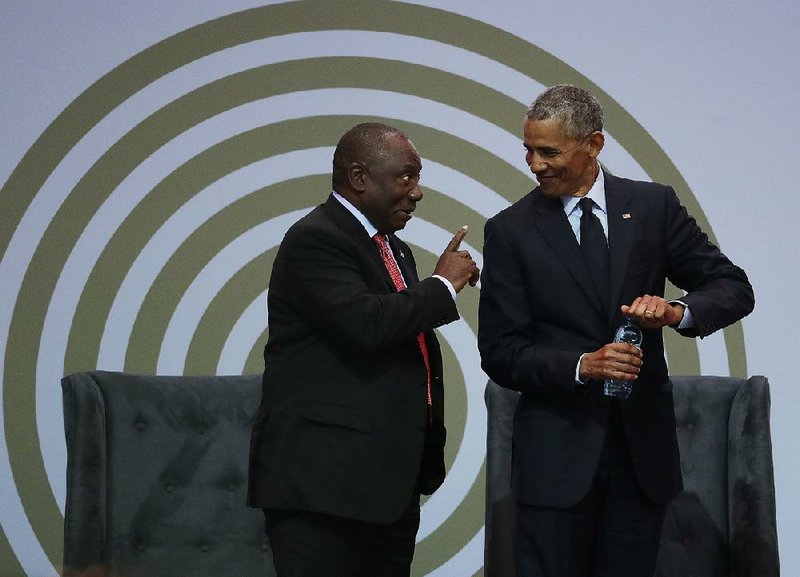JOHANNESBURG -- In his highest profile speech since leaving office, former President Barack Obama on Tuesday delivered a pointed rebuke of "strongman politics," taking aim at the "politics of fear, resentment, retrenchment," and decrying leaders who are caught lying and "just double down and lie some more."
Obama was cheered by thousands in Johannesburg's Wanderers Stadium as he marked the centenary of Nelson Mandela's birth by urging respect for human rights, the free press and other values he said were under threat.
He rallied people to keep alive the ideals that the anti-apartheid activist worked for as the first black president of South Africa, including democracy, diversity, gender equality and tolerance.
Obama opened by calling today's times "strange and uncertain," adding that "each day's news cycle is bringing more head-spinning and disturbing headlines."
"We see much of the world threatening to return to a more dangerous, more brutal, way of doing business," he said.
"That kind of politics is now on the move," Obama told the crowd. "It's on a move at a pace that would have seemed unimaginable just a few years ago. I'm not being alarmist; I'm simply stating the facts."
A day after President Donald Trump met in Helsinki with Russian President Vladimir Putin, Obama criticized "strongman politics."
"Look around," he said. "Strongman politics are ascendant suddenly, whereby elections and some pretense of democracy are maintained, the form of it, but those in power seek to undermine every institution or norm that gives democracy meaning."
"Just by standing on the stage honoring Nelson Mandela, Obama is delivering an eloquent rebuke to Trump," said John Stremlau, professor of international relations at Witwatersrand University in Johannesburg.
He called the timing of Obama's speech auspicious -- one day after Trump's summit with Putin -- and said the commitments that defined Mandela's life are "under assault."
"Yesterday, we had Trump and Putin standing together; now we are seeing the opposing team: Obama and Mandela."
This was Obama's first trip to Africa since leaving office in 2017. Earlier this week, he stopped in Kenya, where he visited the rural birthplace of his late father.
Obama's speech noted how Mandela, who was imprisoned for 27 years, kept up his campaign against what appeared to be insurmountable odds to end apartheid, South Africa's harsh system of white minority rule.
Mandela, who was released from prison in 1990 and became president four years later, died in 2013 at the age of 95. He left a legacy of reconciliation and diversity along with a resistance to inequality -- economic and otherwise.
The first black president of the United States spoke up for equality in all forms, adding: "I would have thought we had figured that out by now."
Obama praised the diversity of the World Cup champion French team, and he said that those countries engaging in fear of people from other countries "eventually ... find themselves consumed by civil war."
He noted the "utter loss of shame among political leaders when they're caught in a lie and they just double down and lie some more," warning that the denial of facts -- such as climate change -- could be the undoing of democracy. "Look, let me say: Politicians have always lied, but it used to be that if you caught them lying, they'd be like, 'Ah, man.'"
He also addressed growing anti-immigration policies in the United States and Europe.
While it is "not wrong" to want to protect the country's borders or expect that immigrants assimilate, Obama said, it "cannot be an excuse for immigration policies based on race or ethnicity or religion."
"We can enforce the law while respecting the essential humanity of those who are striving for a better life," he said. "For a mother with a child in her arms, we can recognize that could be somebody in our family, that could be my child."
Obama's speech drew on his great admiration for Mandela, a fellow Nobel Peace Prize winner whom Obama saw as a mentor.
When Obama was a U.S. senator, he had his picture taken with Mandela. After Obama became president he sent a copy of the photo to Mandela, who kept it in his office. Obama also made a point of visiting Mandela's prison cell and gave a moving eulogy at Mandela's memorial service in 2013, saying the South African had inspired him.
"On Madiba's 100th birthday, we now stand at a crossroads," Obama said, using Mandela's clan name, a term of affection in South Africa for him. "A moment in time in which two very different visions of humanity's future compete for the hearts and minds of citizens around the world. Two different stories, two different narratives, about who we are and who we should be."
Countries like Russia and China are trying to take advantage of the moment of uncertainty, he said. Asserting its growing economic prowess, China challenges criticisms of its human rights record. After the collapse of the Soviet Union, Russia is trying to rebuild its regional and international influence.
"Within the United States and within the European Union, challenges to globalization first came from the left but then came more forcibly from the right," Obama said. "These movements tapped the unease that was felt by many people who lived outside the urban cores, fears that economic security was slipping away, that their social status and privileges were eroding, that their cultural identities were being threatened by outsiders, somebody who didn't look like them or sound like them or pray as they did."
But Obama reminded the crowd that "we've been through darker times. We've been through lower valleys."
Information for this article was contributed by Andrew Meldrum of The Associated Press and by Matthew Haag of The New York Times.
A Section on 07/18/2018
